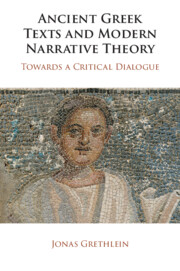Book contents
- Ancient Greek Texts and Modern Narrative Theory
- Ancient Greek Texts and Modern Narrative Theory
- Copyright page
- Contents
- Figures
- Acknowledgements
- Chapter 1 Narratology and Classics
- Chapter 2 Word and World: Fiction(ality)
- Chapter 3 Voice(s): Author/Narrator/Character
- Chapter 4 Minds
- Chapter 5 Motivation
- Chapter 6 Ancient Texts and Postmodern Challenges
- References
- Index Locorum
- General Index
Chapter 2 - Word and World: Fiction(ality)
Published online by Cambridge University Press: 11 May 2023
- Ancient Greek Texts and Modern Narrative Theory
- Ancient Greek Texts and Modern Narrative Theory
- Copyright page
- Contents
- Figures
- Acknowledgements
- Chapter 1 Narratology and Classics
- Chapter 2 Word and World: Fiction(ality)
- Chapter 3 Voice(s): Author/Narrator/Character
- Chapter 4 Minds
- Chapter 5 Motivation
- Chapter 6 Ancient Texts and Postmodern Challenges
- References
- Index Locorum
- General Index
Summary
While some Classicists have made cases for the birth of fiction, linking it to various authors and texts, others have argued that fictionality is a core concern of Greek literature from its beginnings to the Imperial era. In chapter 2, I agree with the idea that fictionality did not have to be discovered at some point but then proceed to argue that neither did it ever play an important role. After presenting evidence for the familiarity of fictionality in antiquity, I reconsider two authors who often appear as cornerstones in histories of fictionality, Gorgias and Aristotle. A closer look at their reflections draws our attention to two dimensions of ancient narrative that were deemed far more important than its referentiality, namely its immersive quality and its moral thrust.
Keywords
- Type
- Chapter
- Information
- Ancient Greek Texts and Modern Narrative TheoryTowards a Critical Dialogue, pp. 20 - 51Publisher: Cambridge University PressPrint publication year: 2023

